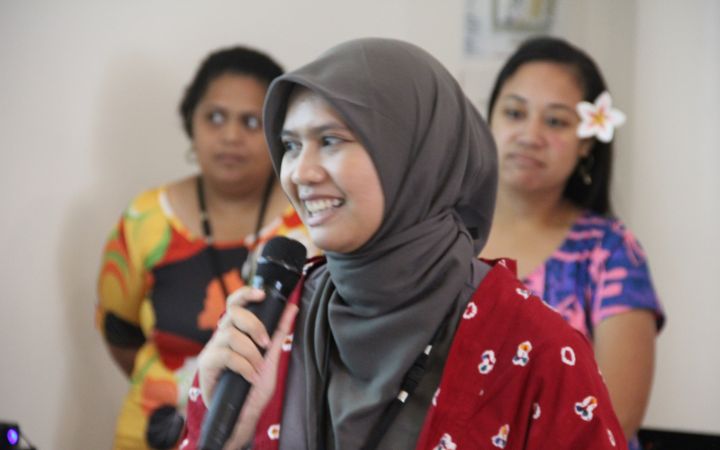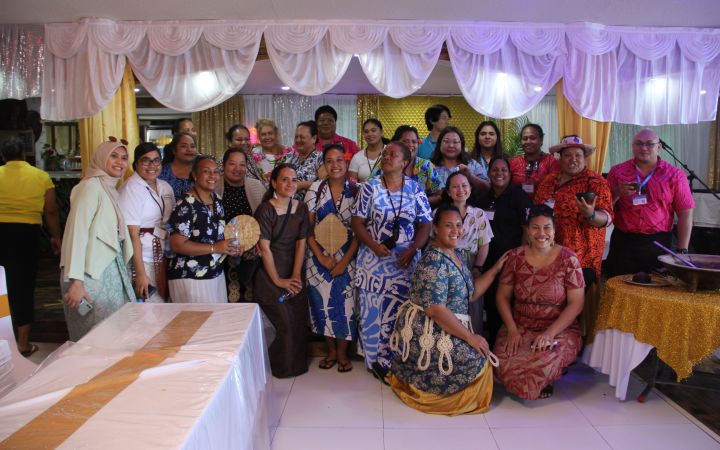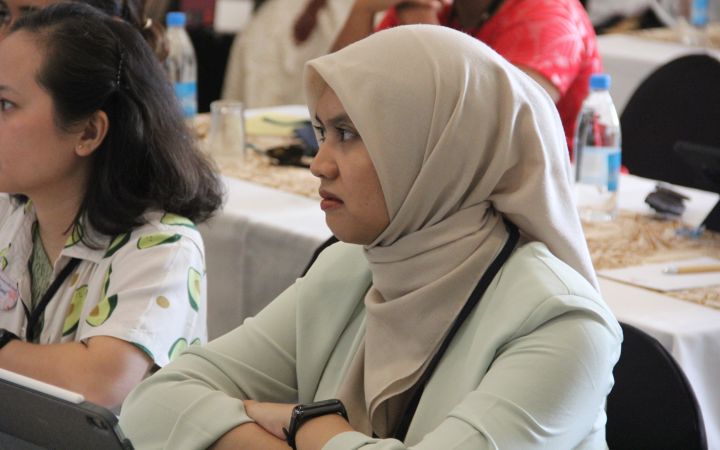- Fega Ayu Pangestika, a disaster management analyst from Indonesia, became interested in disaster response after observing how her grandfather reacted during the 2010 Mount Merapi eruption.
- She noticed that spiritual leaders influenced people's actions during the crisis, prompting her to explore more culturally sensitive disaster management strategies.
- In 2023, Fega joined the UNITAR Women’s Leadership Training Programme to enhance her skills in disaster risk reduction and was among the top performers invited to a regional workshop in Tonga.
- Fega learned about gender equality in disaster management, especially examples from Pacific Island participants, and believes empowering women is key to building stronger, more resilient communities.
27 November 2024, Hiroshima, Japan - In October 2010, as ash and smoke darkened the skies over Java, Fega Ayu Pangestika found herself in an unfamiliar place. Mount Merapi, located on the border of Central Java and Yogyakarta in Indonesia, had violently erupted. The eruptions continued into November, displacing more than 360,000 people and killing nearly 400.
Amid the chaos, Fega noticed that some people refused to evacuate and that people appeared to follow the guidance of spiritual leaders rather than of government officials. It sparked a deep curiosity of how people behave during crises, leading Fega to study psychology and disaster and crisis management and to eventually become a disaster management analyst.
Challenges in Disaster Management and Community Response
At the time of the eruption, Fega was a junior high school student. She had recently moved to her grandparents’ village while her parents worked in the nearby city. As the disaster unfolded, she observed the contrasting reactions around her with a mix of confusion and worry. Her family, following official instructions, evacuated quickly to safer areas, but her grandfather was reluctant to leave despite the obvious danger.
It left her struggling with a deep question: why did people react so differently to the same disaster?
She saw that the local spiritual leaders had a significant impact on how the community responded to the disaster, highlighting for her how cultural beliefs can complicate disaster response. Recognizing this dynamic has been crucial for more effective and culturally aware approaches to disaster preparedness and response, and Fega notes that the Indonesian government disaster management strategies appear to have since incorporated respecting and working with local spiritual influences.
Expanding Horizons through the UNITAR Training Programme
After gaining experience as a disaster management analyst, Fega worked on several projects related to disaster response and management. In 2023, encouraged by her colleagues, Fega joined the UNITAR Women’s Leadership in Tsunami-based Disaster Risk Reduction Training Programme for World Tsunami Awareness Day to further develop her professional's skills.
The UNITAR training programme aimed to empower women from small island developing states, especially in the Pacific, and Asian countries with practical expertise and insights necessary for spearheading disaster risk reduction management initiatives that are both gender-inclusive and oriented to the whole of the community.
The 2023 programme trained women leaders from 9 Pacific and other small island developing states and Asian countries: Cook Islands, Fiji, Indonesia, New Zealand, Palau, Philippines, Samoa, Tokelau and Tonga on gendered leadership and inclusive disaster risk reduction. Over 100 learners joined the first online learning phase, and Fega was among the top 19 performers invited to the regional workshop 2023 in Nuku’alofa, Tonga. This opportunity allowed Fega to further enhance her skills and knowledge in disaster management, with a focus on tsunami risk reduction and women’s leadership in crisis situations.
Learning Gender Equality in Disaster Management from the Pacific
Participating in the training, and especially the workshop in Tonga, gave Fega a new perspective on disaster management practices outside Indonesia. From the Pacific Island participants, she learned about and was impressed with the progress made in these islands countries in involving both men and women equally in disaster preparedness and response. She found this inclusive approach to be much more advanced compared to what she has seen in Indonesia.
Fega thinks that Indonesia’s sheer size and its many islands lead to uneven levels of gender equality, with big differences from one province to another. That is why she believes in the essential need to empower women. Giving women the tools and expertise to take the lead in disaster risk reduction – in a way that includes everyone and focuses on the community – will ultimately help build stronger, more resilient communities.
...you teach a woman, the woman will also teach their family, teach their community, and in the end, it can also support the resilience of their nations.” —Fega Ayu Pangestika, disaster management analyst and UNITAR alumna, Indonesia
Gratitude and Encouragement for Women Leaders
Fega expressed her gratitude to the Government and People of Japan for this programme.
This programme has been truly helpful for us women to get a grasp of disaster management and leverage our leadership skills.” —Fega Ayu Pangestika, disaster management analyst and UNITAR alumna, Indonesia
She also recognizes the challenges that fellow women leaders face in the male-dominated field of disaster risk management. Fega encourages them to remain steadfast. She hopes their perseverance and dedication will help them overcome difficulties, inspire others and make a lasting impact in their communities.
UN Online Volunteer Aditya Barus contributed to this article.
About UNITAR
The United Nations Institute for Training and Research (UNITAR) is a dedicated training arm of the United Nations. In 2023, UNITAR trained over 540,000 learners around the world to support their actions for a better future. UNITAR has a global presence, with offices in Geneva, Hiroshima, New York and Bonn and networks around the world. Find out more at www.unitar.org




